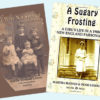Memoir writing techniques refer to the “tools” of writing. Tools are instruments people use to make or facilitate fashioning something. Often, we cannot make what we want to make without the proper tools. So tools are not only helpful, they are often necessary to our success.
If you were a carpenter, you would use hammers and saws and levels, etc., to create solid, beautiful objects. The carpenter who uses stones and tree branches and kicks materials together with his feet, however, is not likely to produce a solid, beautiful result. (Not that I would know from personal building experience!)
A range of tools is also true with writing. There are “tools” which we call memoir-writing techniques. If you use them, they will help you to write a more elegant, more interesting and more impactful memoir. Other tools—or lack of them—will produce crude, uninteresting pieces of writing.
How to Use this Category
This section on memoir-writing techniques is our most visited category on the Memoir Writer’s Blog. Rightfully so as it contains a cornucopia of suggestions for better writing—or should I say “tools” for better writing.
If you have a specific inquiry—for instance, “which point of view should I write my mother’s memoir in?”—go directly to that subcategory in the right hand menu of “Blog Categories” under “Techniques.” In most subcategories, you will receive plenty of insights to help you with your issue. (Beyond this, you ought to consider coaching. Coaching has helped many writers break through impasses—of technique, motivation, insight.)
There are other visitors who may not have a specific need and so may prefer to read through the different titles to select one to learn about various memoir-writing techniques they may eventually need.
Consider this category as a university-level reading list for you to inform yourself on the possibilities of memoir writing.
Below are articles which present many different memoir writing techniques. This list does not, by any means, exhaust the possibilities of techniques. Learn to use these and other tools of writing.
One more thing…
One article in this category, How to write a memoir: our 21 Best Memoir-Writing Tips to get you writing your memoir—quickly and well—and getting it into the hands of your public, ought to be bookmarked for continuing reference. It’s that good.
In conclusion
The posts below ought to be persuasive in getting you beyond spontaneous writing into writing that helps a reader understand what you have written.

Who is Your Memoir Narrator?
This may sound like a trick question, but it’s not. In fact, “who is your memoir narrator?” is a very serious question that will determine—or at least greatly influence—the tone and the theme of your narrative and how your reader views your story as being truthful.

Writing Another Person’s Memoir: Can you use the first person pronoun?
Shouldn’t writing another person’s memoir be called writing biography rather than writing memoir? You the writer are, after all, not the subject. Doesn’t that make it a biography? But, are there occasions when a biography can justly be called a memoir? In one of my books, A Sugary Frosting / Life in a 1960s Parsonage, […]

Similes and Metaphors: Don’t Let Them Scare You!
Don’t be afraid of similes and metaphors. “I don’t quite know how to describe what I’m feeling,” you might say during your writing as you grope for a way to describe in words this emotion that is beyond words.

Dramatic story development, rather than dramatic events, adds up to an interesting memoir
To view this post as a YouTube video, click here. — People will sometimes suppose that only big drama can make an interesting memoir. Of course, there are many readers who require constant titillation if they are to remain reading. Perhaps they are not the readers you should be seeking for your memoir. Nonetheless, nearly […]

Four Tips For Moving Your Memoir Plot With Action
Action drives your story and keeps your readers interested. Writing with effective action is the key to creating lifestories that people want to read. Here are four tips for moving your memoir plot with action.

Dialog Tags: the good, the bad and the sometimes intrusive.
We all know how important a precise and varied vocabulary is to our memoir writing. Words are our tools to make meaning. Most of the writers I have worked with want to develop the precise and varied vocabulary that can be so helpful in writing narrative. Unfortunately, they also believe that an extensive vocabulary is […]

Writing Feelings into Your Memoir
How to write feelings into your memoir is a rather important topic. Recently on the Forum, David wrote about not accessing the feeling side of his memories, of writing a memoir that, if I am understanding him right, was all details and facts. Below is my response which can serve as a stand alone article, […]

Develop the Setting: the Somewhere of Your Story
Writers seem to grasp that every memoir needs well-developed characters and actions, but the same is always not true when they are asked to develop the setting of their memoir. Develop the Setting The term “setting” is generally understood to refer to the physical “where” in which your memoir takes place. This can be a […]

10 Tips to Write Better Dialog—Make it More Effective and Interesting
If dialog is an essential part of every memoir—and of course it is, then why not make it effective—make it say what needs to be said—and interesting—so that it also keeps the reader reading. Write better dialog. Dialog performs several functions that make your story appealing and meaningful. Every memoir ought to have some dialog […]
